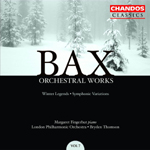Considering the evident paternity of Bax's music in late romantic and impressionist styles, the richness of original invention flowing from his pen keeps me expecting something new and fresh with every newly acquired work. It is partly on account of his incredibly fecund orchestral imagination, which on the whole provides ample compensation for the sometimes surprising dearth of memorable melodic invention. You would have to go far to find another composer with such a voluptuous palette and so much talent for mixing the brush strokes on his palette.
As it happens, all my previous Bax albums came from the Chandos stable of Handley and Thomson. Maybe chance? I don't think so. For decades., I knew only one Bax composition, Tintagel in the Barbirolli version. Thomson is so much better, not only in terms of sound, but in his performance which is refined, passionate and deeply involved. I think he is (was, I fear) a natural for Bax, just as the Chandos sound is the perfect match for Bax's bravura orchestrations.
Accordingly it was with high expectations that I approached this album. I knew that two of his decidedly weaker works are his concertos for cello and violin. Perhaps his creative intelligence rebelled against the need for soloistic virtuosity? At any rate it struck me that both of them lacked the grateful tunes that are de rigeur in this form. But from an accomplished pianist I hoped different things in piano concertos. And I am glad to say that I was not disappointed with at least one of these two.
'Concerto' is in fact the wrong description - they are both symphonic poems with a prominent, but integrated solo part. I find it preferable (rightly or wrongly) to listen to the music at least 2-3 times without bothering to acquaint myself with any 'poetical' ideas that might have influenced it. If the music can't stand on its own two feet, then it's mere decoration. The 'Winter Legends' fully met my expectations in this respect. A magnificent orchestral journey through a wide range of moods, from wistfully melancholic to grand outbursts of passion, from chamber music filigree to massive brass-laden panoply. An experience wotth the full price of admission.
I say this because the Variations are clearly a step down. Here Bax does not escape sounding both trivial and sentimental at times, which makes for a sore contrast to those episodes where he is fully in his imaginative fettle. Unfortunately the weak portions of the work become the more conspicuous as they drag on beyond reasonable length, so that the whole work outstays its welcome some time before the end. Having now read the notes, I understand that Bax truncated the work for its first performer, Harriet Cohen - ostensibly because she couldn't manage some of the difficult piano writing. I wonder if after all it was wise to reinstate the cuts. A composer does not as a rule cut things without good reason, and one performer's limitations don't seem that strong an argument. But this I may leave to other purchasers to decide. The cuts might have made the work a more coherent unity.
Margaret Fingerhut seems not to have such problems. She discharges her duties as an accomplished artists, and it needs to be said that blatantly virtuosic elements hardly play a role in these symphonically scored works. No praise is too high for the man in control, however. The orchestral canvas is of the highest quality.
I think that Chandos were as lucky to have him on their books as he was to find such an outstanding recording team. The sound on this album confirms once more for me that the Chandos people know their business. There is a natural ambience, a luminous yet transparent soundscape that could not be bettered. No 'monkey tricks' here, i.e. making the winds aurally jump from one place to another. You're in the best seat of the house and stay there. The balance between piano and orchestra is ideal.
J LAWRENZ
















 My Wish List
My Wish List




